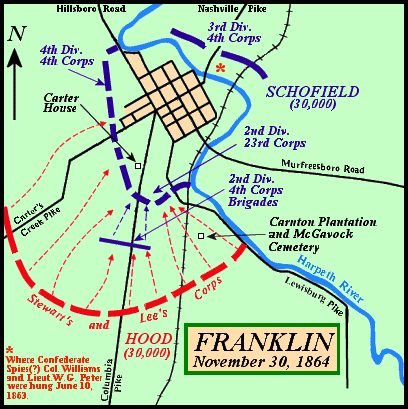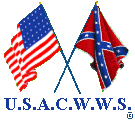
|
U. S. CIVIL WAR
PHOTOGRAPHS
|

|
FRANKLIN, TENNESSEE
(PAGE 1 OF 5)
In the text, the icon  is a link to the definition of the word it marks. is a link to the definition of the word it marks.
Use your
browser's "back" button to return to the page.
 141
Franklin Print
141
Franklin Print
| |
November 30, 1864
Estimated Casualties : 8,587 total
(US 2,326; CS 6,261)* : 8,587 total
(US 2,326; CS 6,261)*
Having lost a good opportunity at Spring Hill to hurt significantly the Union
Army , Gen. John B.
Hood marched in rapid pursuit of Maj. Gen. John M. Schofield's retreating Union
army. Schofield's advance reached Franklin about sunrise on November 30 and
quickly formed a defensive line in works thrown up by the Yankees in the spring
of 1863, on the southern edge of town. Schofield wished to remain in Franklin to
repair the bridges and get his supply trains over them. Skirmishing at Thompson's
Station and elsewhere delayed Hood's march, but, around 4:00 pm, he marshaled a
frontal attack , Gen. John B.
Hood marched in rapid pursuit of Maj. Gen. John M. Schofield's retreating Union
army. Schofield's advance reached Franklin about sunrise on November 30 and
quickly formed a defensive line in works thrown up by the Yankees in the spring
of 1863, on the southern edge of town. Schofield wished to remain in Franklin to
repair the bridges and get his supply trains over them. Skirmishing at Thompson's
Station and elsewhere delayed Hood's march, but, around 4:00 pm, he marshaled a
frontal attack against the
Union perimeter. Two Federal brigades against the
Union perimeter. Two Federal brigades holding a
forward position gave way and retreated to the inner works, but their comrades
ultimately held in a battle that caused frightening casualties. When the battle
ceased, after dark, six Confederate generals were dead or had mortal wounds.
Despite this terrible loss, Hood's army continued on toward Nashville. holding a
forward position gave way and retreated to the inner works, but their comrades
ultimately held in a battle that caused frightening casualties. When the battle
ceased, after dark, six Confederate generals were dead or had mortal wounds.
Despite this terrible loss, Hood's army continued on toward Nashville.
* Federal Casualties - 2,326 men (23rd Corps 958, 4th Corps 1,368)
189 were killed, 1,033 were wounded, and 1,104 were captured.
Major General David Stanley, Corps Commander, was a casualty.
Confederate Casualties - 6,261 men
1,750 were killed, 3,800 were wounded, and 702 were captured.
15 Confederate Generals and 65 field grade officers were casualties.
(Text Source: U.S. Gov't, National Park Service and Others.)

Franklin Battlefield Map
THE CARNTON PLANTATION


Carnton Plantation House

Carnton Plantation Sign
(The Carnton House is marked with an arrow)
CARNTON PLANTATION
Carnton was built ca. 1815 by Randal McGavock (1768-1843), planter, political
leader and mayor of Nashville. Named after the McGavock home in Northern
Ireland, the house was greatly enlarged by Randal ca. 1826. His son, John,
later added the Greek Revival porches, one of which served as an observation
post for Gen. Nathan B. Forrest during the Battle of Franklin, Nov. 30, 1864.
After the Battle, Carnton served as a hospital. The bodies of Generals Adams,
Cleburne, Granbury, and Strahl rested on the back porch the next morning.
Carnton was acquired by the Carnton Association in 1978
|
|
|
PAGE TWO
 >
Civil War Photos
>
Western Map
> Franklin
>
Page 2
>
3
>
4
>
5
>
Civil War Photos
>
Western Map
> Franklin
>
Page 2
>
3
>
4
>
5
|
|


 141
141


 141
141